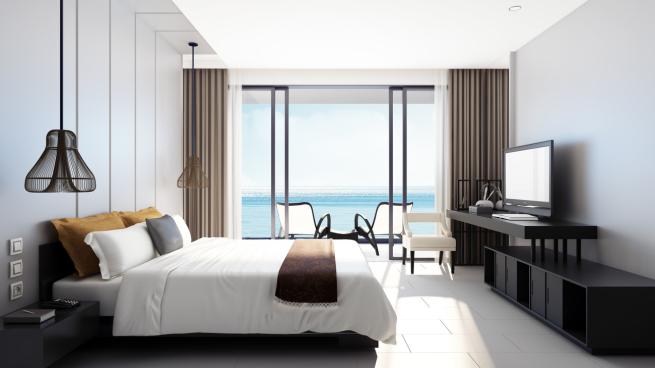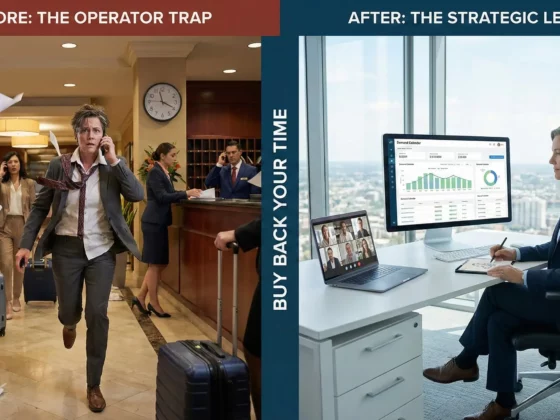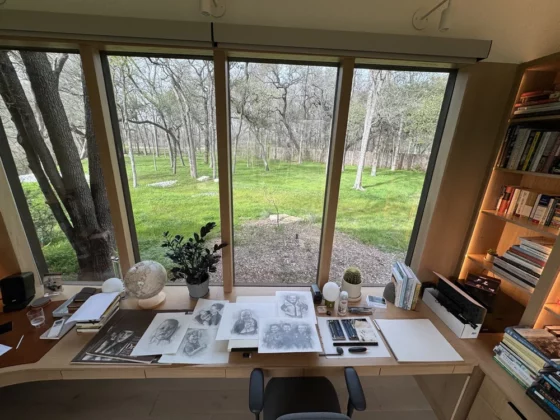
Every hotel operator wants their guests to have positive experiences and leave good reviews. Today, believe it or not, the humble in-room TV is increasingly having a major impact on the overall level of satisfaction a guest experiences. As digital entertainment dominates many people’s leisure time, hotels that provide TVs with intuitive controls, modern content options and enhanced safety features can stand out from their competition. But how hard can it be to make a TV safe and functional for guests? After all, a TV is a TV right?
Actually, there are major differences between a TV designed for someone’s living room and a TV designed for a hotel room, starting with the simplest piece: the TV stand. In homes, a basic TV stand satisfies most needs. In hotel rooms, where owners have concerns about guest safety and theft, the ideal TV stand provides a way to lock it to the desk or dresser to secure it. And some hotel TVs may even offer the ability to swivel the TV for flexible use in multiple room designs.
That brings us to the idea of commercial hospitality TVs, which manufacturers build to specifically benefit both users and operators in hospitality environments. For instance, some TV/software combinations can empower hotel owners to finetune available content provided, create custom content and channels, and even provide enhanced features such as automatic logout from streaming apps.
Guiding the Guest Experience
Imagine the consumer journey of a hotel guest. Once they are in their room, they typically want it to be as comfortable as their own living room. When they turn on the TV, would you prefer they see static, a random channel left by the previous guest, or a custom welcome screen featuring the hotel’s branding? Would you rather offer a channel displaying local weather or a customized guide that includes both cable and online channels?
The newest hotel TVs can deliver these experiences and more, with the ability to log in to popular streaming services and even to stream content directly from mobile devices to the TV via Google Cast or Apple AirPlay, giving each guest a completely unique and customized experience.
When people are at home, they likely want their TV to stay logged in to their accounts all the time. They also probably don’t have dozens of other nearby TVs that are the same model, and they may have custom names for their network and devices to make them easier to locate. For hotels where there can be hundreds of TVs or wireless access points, both the guest and the owner need the connection process to be as simple and secure as possible, as well as having all the apps automatically log out so other guests can’t access them.
Hotel TVs can solve both of these issues with room-based connection availability and automated app logouts that are coordinated with checkout times. This means only people currently staying in a room can see or connect to that room’s TV, and all records of their logins are erased before the next guest is checked in.
Many hospitality smart TVs also provide the ability to create custom channel packages that can be directed to specific room types to create tiered services. Additionally, some TVs can offer HD premium channels and content without requiring a set top box in each room. Already we can see that using a consumer grade TV made for homes greatly limits the available customizations and options, sacrificing advanced modern capabilities for a slightly lower upfront cost.
Make Maintenance Easy
There’s plenty to be said about offering guests premium experiences, but hospitality TVs can also greatly simplify and enhance a property’s TV maintenance and setup needs. Whether it’s a 10-room B&B or a 200-room chain hotel, it’s important for every room to provide the same user experience. To do so, technology managers have to ensure that the TVs are all up to date, which used to require going to each room and checking them individually.
With newer hotel TVs and accompanying backend hardware such as a server, managers can now program or set up all of the TVs at once right from their office, immediately saving money and time. This also enables some remote troubleshooting in the event of a guest complaint, reducing the need for staff interactions and inconvenience.
Today’s TVs come in all shapes and sizes, but not all of them are designed with a focus on quality and positive viewing experiences. As a core expectation of travelers, TVs in hotels need to be reliable, upgradeable and repairable, so buying from manufacturers with strong backgrounds in software and customer support can make a huge difference in day-to-day operations. Additionally, major manufacturers constantly test their devices to ensure customers enjoy the same excellent experiences when apps are updated or new ones are introduced, so guests know what to expect and can easily enjoy the available entertainment. In general, hotel TVs also offer a much longer warranty (up to five years) than home TVs (usually one year), helping businesses reduce unexpected expenses while guaranteeing consistent operations and guest experiences.
Striving for Perfection
If a hotel aims to impress guests, every little thing must be accounted for. While the list of concerns used to end at clean sheets and air conditioning, the in-room TV can now be a major factor in a guest’s overall satisfaction. By using TVs and content systems that allow customization and remote access, hoteliers can streamline both the guest experience and their ongoing maintenance needs to improve interactions and reduce costs.
As new apps, tools or content services are developed, manufacturers often integrate new capabilities such as Alexa voice control. In the end, choosing an off-the-shelf TV from a big box store or trying to build a DIY smart TV solution for a hotel is likely to create more problems than it solves, leaving guests frustrated and unsatisfied. In order to provide modern luxuries and meet the expectations of tech-savvy travelers, it’s vital to use tools that are built for the job and are capable of performing specialized tasks that consumer devices aren’t designed to do.
About the Author
Jacob Benner leads hospitality business development at LG Business Solutions USA, the largest provider of hotel TVs in the United States.






